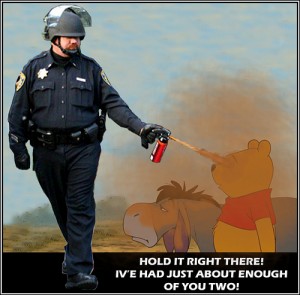Posting a day early since I’ll be traveling tomorrow. Because I know everyone would feel deprived otherwise
Plenty of ink has been spilled (or, I guess, pixels? Ones and zeroes? What is it we’re spilling these days?) over #KONY2012 and its problematic premises. That critique extremely important, but it’s been done and done far, far better than I could, so I’m not going to make that intervention. (I’m also not wading into Jason Russell’s naked rampage, because that’s what late night television hosts get paid for.)
What I’m interested in, instead, is the viral-ness of this campaign, the ways it has traveled. Because, though there’s a long tradition of white liberals rushing in to a situation they don’t understand to save brown children half way around the world, this feels different.
#KONY2012, as Nick Dyer-Witheford pointed out recently when a seminar he gave on my campus turned to the subject, is about seeing social media as coextensive with reality.
Part of this is that, unlike, say, singing for famine relief, point-and-click activism (which I want to dub clicktivism but has apparently has been nominated as part of slacktivism) is light-speed. It requires no effort, which makes the self-congratulatory white-savior thing, old though it is, new by virtue of magnitude. (Confession: I make this critique as someone who “signs” almost every petition Moveon.org puts in my inbox but deletes the mailings that ask for money. In my defense, I do read them and decide if I agree first. I just happen to usually agree. I also sometimes show up at rallies and stuff.)
The very power of that frictionless travel is manifested in the graffiti that has sprung up in seemingly every women’s bathroom on campus.
Now, 100% of the bathrooms in my (pun alert) convenience sample say “Stop Kony” and include the website. But this Sharpie scribble particularly caught my eye (and made me sorely tempted to retaliatory/corrective graffiti) because of the massive irony of the writer putting “Do some research on the LRA if you don’t know this man’s name” when clearly she had herself not done any research.
On the other hand, my Twitter feed has been inundated with critique of #KONY2012. Like, for real, it took over. In just the 24 hours before I began this post I got: Bosco 2012: While We Hunt Kony, Another Indicted War Criminal Lives a Life of Leisure published in the New York Times, Kony 2012 screening in Uganda results in anger, rocks thrown at screen published at boingboing, Kony Heads from Timothy Burke, and a rundown on Child Soldiers Worldwide published by Human Rights Watch, among others.
What’s important here is that I don’t follow any of the original sources. I got all of these announcements at the very least second hand and likely through a longer chain of retweets—there’s no real way to tell how they traveled before they got to me (At least, I don’t think so. And if I’m right about that, somebody should really write an algorithm that can parse that, because it’s interesting. Call it the epidemiology of Twitter). They didn’t even all come to me from the same source (though my colleague who knows a lot of politically active Africans contributed more than most).
There was, in fact, not a single person in favor of the campaign in anything that I’ve seen in the period since the video took off, which led me to temporarily forget that the people I follow are not representative of general public opinion. (Despite having just written a post in which I was surprised to realize I didn’t have a good handle on public opinion of the NBC show Community. Slow learner, I guess.)
And thus it came to pass that I was startled to hear a student in my fitness class profess support for the campaign and state that she’d ordered some of the merchandise.
Let’s parse that moment: Because of who I’d been listening to, I assumed “everyone knows it’s stupid.” Because of who she’d been listening to, she assumed “everyone knows this is the right thing to do.”
And, while I will continue to maintain that the people I’m listening to are working with better information and education than the ones my fitness classmate is, the fact is that I’m just as bad as the restroom writer whose handiwork is displayed above. I haven’t done any research. I’ve just believed what people told me because I trusted those people. This isn’t to now proclaim that those people aren’t trustworthy. They are. But it’s still a bad way to make a decision about world events and public policy.
And that recognition that the educated-person echo chamber is just as bad as the superficial-crisis one is sobering.

